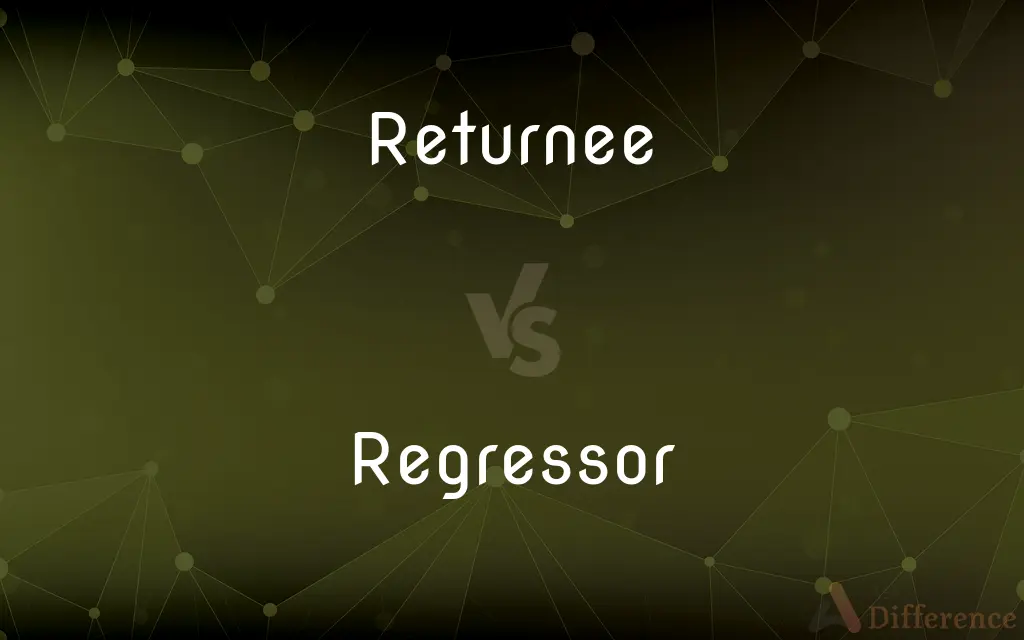Returnee vs. Regressor — What's the Difference?
By Fiza Rafique & Urooj Arif — Updated on April 26, 2024
Returnee refers to someone who returns to a place after a period away, often their homeland; a regressor, in storytelling, typically describes a character who travels back in time or reverts to a previous state to alter an event.

Difference Between Returnee and Regressor
Table of Contents
ADVERTISEMENT
Key Differences
A returnee is commonly understood as an individual who comes back to their country of origin after having been away for significant reasons such as work, study, or migration. This can involve a reintegration into their original cultural and social settings. On the other hand, a regressor is usually a fictional concept, often used in fantasy or science fiction genres, describing someone who returns to a specific point in time, typically with the aim to change past events or outcomes.
Returnees often face real-world challenges such as readjustment to local norms and reconnecting with family and friends, reflecting a physical and psychological journey. Whereas regressors deal with fictional scenarios that focus on existential or moral dilemmas, and their journeys are largely metaphorical or thematic, dealing with concepts like fate and destiny.
The term returnee emphasizes the physical and emotional aspects of returning to a familiar environment after it may have felt foreign due to time spent away. On the other hand, a regressor's journey is conceptual, involving elements of time travel, and the implications of altering history or personal outcomes.
In terms of support and recognition, returnees may receive governmental or organizational assistance to help reintegrate into society, acknowledging the practical challenges they face. Meanwhile, regressors are typically central to narratives that explore theoretical and often fantastical interventions, unsupported by any real-world mechanism.
Returnees are a well-documented demographic in studies of migration and diaspora, often highlighted in social sciences research. In contrast, regressors are primarily explored through literary analysis and media studies, featuring in discussions about narrative techniques and character development.
ADVERTISEMENT
Comparison Chart
Definition
An individual who returns to their place of origin after a period away.
A character who travels back in time to alter events or outcomes.
Context
Real-world, often involving migration or long-term travel.
Fictional, commonly found in genres like fantasy or science fiction.
Challenges
Cultural readjustment, reconnecting with community.
Ethical dilemmas, consequences of changing past events.
Support Systems
May receive assistance from government or community organizations.
Typically unsupported in reality; may receive guidance from other characters in fiction.
Primary Field of Study
Social sciences, migration studies.
Literary and media studies, narrative analysis.
Compare with Definitions
Returnee
A student who returns to school after a period of absence.
As a returnee, he found the campus much changed by new technology.
Regressor
A person who reverts to an earlier developmental stage when under stress.
Under pressure, he became a regressor, throwing tantrums like a child.
Returnee
A former refugee or displaced person returning to their place of origin.
The program focused on the needs of returnees settling back into their war-torn village.
Regressor
In statistics, a variable that predicts or explains another variable.
In their model, age served as a regressor for purchasing behavior.
Returnee
An individual who comes back to their country after living abroad.
After five years in Canada, she returned to Japan as a seasoned returnee.
Regressor
A fictional character who goes back in time to change the past.
The regressor attempted to prevent the disaster that had ruined his homeland.
Returnee
A person returning to their family or community after a long absence.
The family reunion was especially joyful with the returnee among them.
Regressor
A character who revisits past experiences in dreams or through supernatural means.
The novel's hero was a regressor, haunted by visions of his previous lives.
Returnee
Someone who resumes a previous position or role after a hiatus.
The returnee took up his former teaching position with renewed vigor.
Regressor
A technical term in computing for a process that returns to a previous state.
The software regressor helped debug the system by reverting to prior stable versions.
Returnee
One who returns, as from a journey or to school after a long absence.
Regressor
To return to a previous, usually worse or less developed state
When I left the country, my ability to speak the language regressed.
Returnee
A person returning from military duty overseas. See Usage Note at -ee1.
Regressor
To have a tendency to approach or go back to a statistical mean.
Returnee
Someone who comes back or returns, especially to their own country or region.
Regressor
To move backward or away from a reference point; recede
The seas regressed as the glaciers grew larger.
Returnee
A person who sends something back.
Regressor
To induce a state of regression in
Techniques to regress a patient under hypnosis.
Regressor
The act of regressing, especially the returning to a previous, usually worse or less developed state.
Regressor
The act of reasoning backward from an effect to a cause or of continually applying a process of reasoning to its own results.
Regressor
That which regresses, or causes regression.
Common Curiosities
What typically motivates a returnee to come back home?
Returnees often come back for personal reasons, like family ties or cultural reconnection.
How do regressors change the past in stories?
Regressors typically use time travel or supernatural powers to alter historical events or personal experiences.
What are common challenges faced by returnees?
Cultural readjustment and finding employment are significant challenges for returnees.
Do regressors face moral dilemmas?
Yes, they often wrestle with the ethics of changing past events and impacting others’ lives.
Can anyone be a regressor?
In fictional settings, regressors are often chosen or uniquely positioned due to special traits or destinies.
What can be learned from the experiences of returnees?
Their experiences can offer insights into cultural resilience and the complexities of identity.
Are regressors always successful in changing the past?
Not always; many stories explore the unintended consequences of altering time.
Is being a returnee considered advantageous?
It can be, as returnees bring back new skills and perspectives that can benefit their communities.
Do regressors often change the future as well as the past?
Yes, their actions are typically shown to have ripple effects, impacting future events as well.
What genres most commonly feature regressors?
Fantasy and science fiction frequently explore regressor characters and themes.
How do societies typically support returnees?
Programs may include job placement services, counseling, and cultural orientation sessions.
Can a returnee's experience influence their community?
Yes, returnees can influence cultural practices and community perspectives through their shared experiences.
How do authors typically characterize regressors?
They are often depicted as conflicted, burdened by their abilities and choices.
What impact do regressors have on other characters in their stories?
They can profoundly affect other characters' lives, often in unpredictable ways.
What support systems are in place for returnees who struggle with readjustment?
Psychological counseling and community support groups are common aids.
Share Your Discovery

Previous Comparison
Liftoff vs. Takeoff
Next Comparison
Tallow vs. WaxAuthor Spotlight
Written by
Fiza RafiqueFiza Rafique is a skilled content writer at AskDifference.com, where she meticulously refines and enhances written pieces. Drawing from her vast editorial expertise, Fiza ensures clarity, accuracy, and precision in every article. Passionate about language, she continually seeks to elevate the quality of content for readers worldwide.
Co-written by
Urooj ArifUrooj is a skilled content writer at Ask Difference, known for her exceptional ability to simplify complex topics into engaging and informative content. With a passion for research and a flair for clear, concise writing, she consistently delivers articles that resonate with our diverse audience.














































